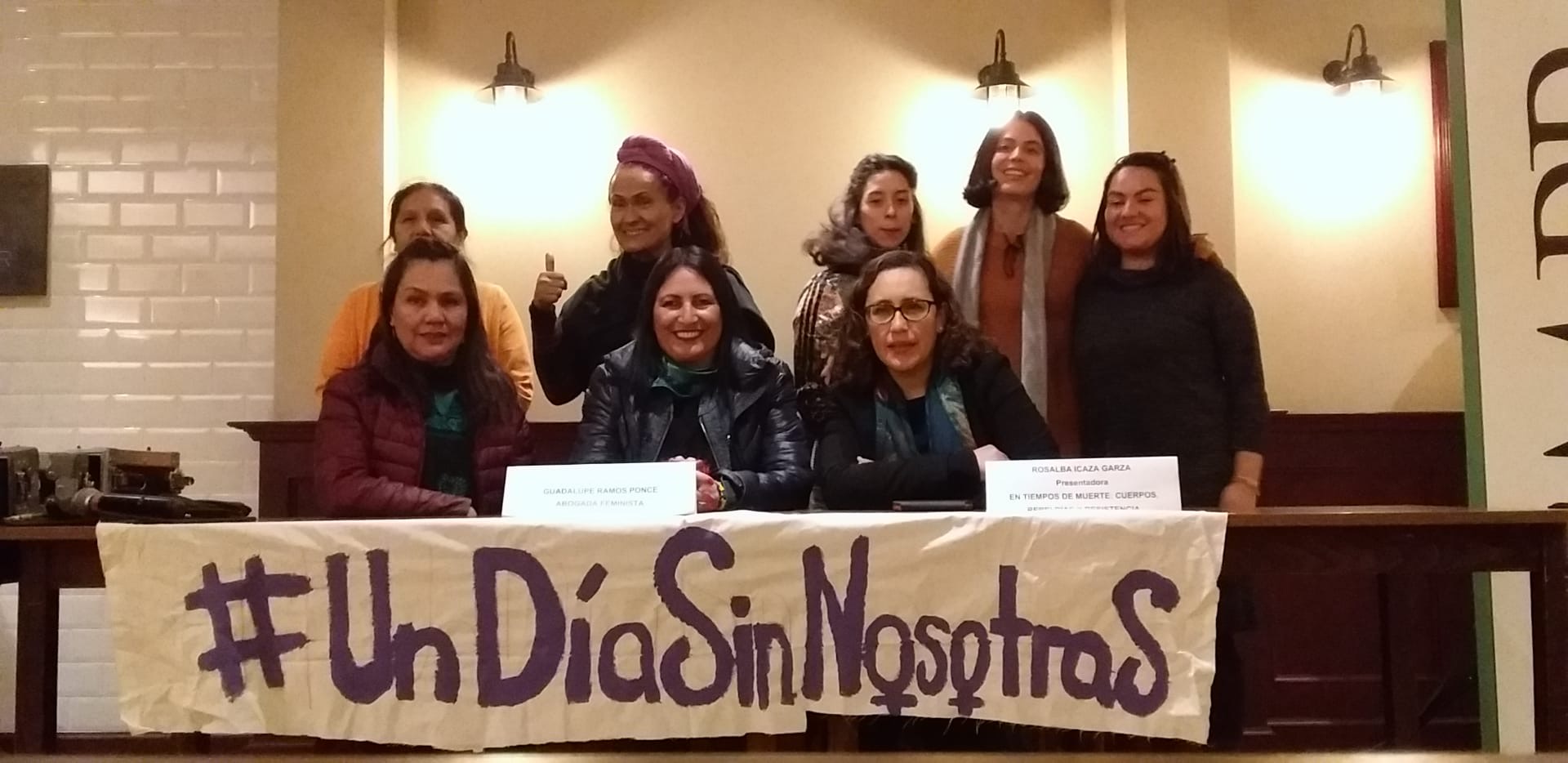Press release
Book presentation In times of death: bodies, rebellions, resistance. Solano, Xochitl & Icaza, Rosalba. (2019) with the presence of one of the coordinators of the publication, Dr. Rosalba Icaza Garza who read the text of Xóchitl Leyva Solano, held on March 7, 2020 at the Espace Kerckheer located in Brussels. In dialogue with the presence of Dr. Guadalupe Ramos Ponce and the moderation by Thamara Cruz.
In the midst of the uncertainty of COVID-19, students, artists, activists and trade unionists from different regions of Belgium attended the presentation. At the beginning of the presentation, Rosalba invites introspection from gratitude and the importance of being together and assessing the possibility of the community. She herself declares herself an activist, feminist and academic aware of the situation of being a migrant and living in countries with a colonialist and operationist background of extractivism. Faced with them, he resists the counterproposal of generating collectivity as an alternative to thinking that leads to dialogue and encouraging the opening of spaces that question epistemologies, unlearning, debate and access to innovation, generate creativity: social, artistic, validate contributions from other knowledge. It is from the feeling that she emerges in the Caribbean resistance, she explains to us, how the possibilities of other nuances of analysis extend, other tasks that validate facts and realities. This digital publication, he also comments, is a compilation produced in an artisanal, collective and self-managed way with free access to circulate and serve as a tool book from Abya Yala. With the aim of discussing it to reformulate positions, rethink values and knowledge of the academy towards activism. The publication consists of twenty-three interventions divided into four parts in the first one, the current time is analyzed and how the bodies of women, young people and girls are being, regardless of the place, annihilated, disappeared, consumed until there is a daily and normalized violence. The second part deals with the forces that give life and are undone through the struggles of the territory, learning from the erotic and breaking into the hegemonic vision of the academic as we know them today. It is in the body-territory that other ways of experiencing pleasure are experienced, the interpretation of territory-body-earth. In the third part, it is considered how the body-politician / body-space is a mobilizing force for activism and questions the norms of gender, race and class and from there how in migration sexuality is interpreted by others. Through dance, music reinvents itself again and explains other ways to resist. In the fourth part, historical terms and categories that arise in the hegemonic enlightenment are reviewed, it is proposed to go beyond only recognizing ourselves as women, men and social constructions such as patriarchy and considering themselves Spanish-speaking, it seeks to vindicate traditional knowledge. And finally, there are the proposals of women poets through the renaming and forming collective groups that build archives and reinterpret identity, life through the recovery of memory, flavors, ingredients and merge in food. . These spaces to generate political dialogues and devise post-capitalist life. The book closes with a poem and the presentation with a reading aloud of the poem I am a woman who resist by Itandehui Olivera.
This book is the result of three years of cognitive justice work integrated by the following Latin American, Caribbean and Afro-descendant authors: Irma Alicia Velásquez, Lorena Cabnal, Moira Millán, Betty Ruth Lozano, Emma Chirix, Gloria Wekker and Andil Gosine, Yurdekis Espinosa, Daniel B. Coleman, Female Battalions and Loba Franca, Virgina Vargas, Wendy Harcourt, Aura Cumes, Paulina Trejo SAT, Itandehui Olivera, Patricia Botero, Teresa María Díaz, ISS Students, The Black Archives, Ijeoma Umebinyuo, Camila Pascal, Isabel Tello and Sofía Carballo in the coordination Rosalba Icaza Garza and Xóchitl Leyva Solano. All of them in struggle proposing a resistance and claiming spaces destined for study, analysis that allow discussion, debate towards projects and exchange of other knowledge. From Editorial Retos this is the fourth volume of a series that is downloadable and free access from the site www.clacso.org, https://editorialretos.wordpress.com/,
You can access the presentation of the book through the following link:
Text by: Thamara Cruz

March 2020.


